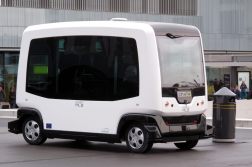Denver’s experimental smart city gets microgrid, Wi-Fi, autonomous shuttles

An effort by Panasonic to build its own smart city just outside Denver is advancing rapidly with a recently completed microgrid, numerous Internet of Things projects, and an autonomous shuttle service scheduled for launch this spring.
Since the company started building the site in early 2016, it has made sizable strides to develop the connectivity, electric utility and transit infrastructure, Panasonic executive Jarrett Wendt told PC Magazine earlier this month. The 382-acre site sits just outside of the Denver International Airport and is adding new emerging technologies all the time.
Wendt said that the smart city now being built, called Peña Station Next, received approval from public utility officials and installed the community’s first microgrid, which is run partially on solar power, installed smart LED street lighting, added a parking management system, interactive kiosks and spread free community-wide Wi-Fi throughout.
These are just a few of the projects already underway — the site also includes the implementation of a $72 million contract with the U.S. Department of Transportation to develop infrastructure and technology for connected vehicles. Wendt said the contract is currently the largest connected vehicle project in the nation. The project consists of a platform that allow a city control room to monitor connected roads and vehicles in real time.
Peña Station Next is a test bed for technology being developed by Panasonic, under the CityNow brand, in partnership with L.C. Fulenwider, a Denver-based real estate developer. The project build’s upon a previous Panasonic effort to build a smart town in Japan called Fujisawa.
Wendt said that Panasonic chose Denver for its smart city work because of the city’s willingness to explore next-generation technologies and forego the red tape that can hold up many experimental projects.






